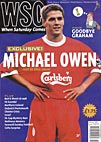 Mark Howell on his boyhood club as they face an uphill task to survive
Mark Howell on his boyhood club as they face an uphill task to survive
My home town team is Chester City. In their 113-year history they have been to the semi-finals of the League Cup, won promotion three times and won the Debenhams Cup once. That is it. We are one of those teams who have never played at Wembley. We are also two months or so away from extinction.
In April last year, five months after a winding-up order had been dismissed, we were reported as being in deep financial difficulties. On transfer deadline day, the club were thrown a lifeline when Dundee United signed Northern Ireland international and club captain Iain Jenkins and centre half Julian Alsford for a £250,000 joint fee. Everton chipped in with £250,000 for 17-year-old starlet Matthew McKay, veteran of five first team games and product of manager Kevin Ratcliffe’s flourishing youth set-up. The deal is worth up to £750,000 with appearances. .
Following these deals, chairman Mark Guterman announced he had put in place a “five point action plan” designed to “safeguard the future of Chester City FC”. However, in June, two days prior to a pre-season friendly at home to Tranmere, North West Water turn up to disconnect the supply due to non-payment of water rates. Kevin Ratcliffe had to drive into Chester and withdraw £5,000 out of his own account to pay the debt, thus averting the postponment of the match. According to Guterman, the water bill had not been paid due to an “administration error” and “the money was transferred back into Kevin’s account within 24 hours”.
A week later, local media reported that the City players had not been paid on time – and not for the first time. With the full backing of the supporters, the players threatened to boycott a sell-out friendly against Everton. This was averted when Guterman met a players’ representative at an undisclosed location with the pay cheques at noon on the day of the match.
The list of problems continued to grow. It was revealed that the people who do the laundry for the club had confiscated the away kit last season, forcing the team to wear the previous year’s strip. The coach company who take the team to away matches were owed a five-figure sum and the club had the televisions and satellite receiver repossessed during the summer. The club even had to let supporters call for taxis from the club offices as the pay-phone in the social club had been cut off.
In August, when the players were paid over two weeks late (six weeks since their previous pay packet), they were training at home as they could not afford to travel to Chester. This spurred the Independent Supporters Association to launch the Chester City Fighting Fund at the Worthington Cup game with Port Vale. The first collection raised over £1,200 from just over 2,000 fans, including those from Port Vale. This supporter solidarity has been reflected across the country with Southend United and Brentford fans even organising collections at our away games there.
With a local consortium showing interest, Guterman, who was still driving the club-leased £80,000 Aston Martin and had not been to the ground since May, put the club up for sale. Very few details were forthcoming to anybody who replied to the ad in the Financial Times. Club accounts had not been submitted to Companies House for a couple of years.
On October 12th 1998, the day before another Inland Revenue winding-up hearing in the High Court, Begbie Traynor Ltd were appointed Official Administrator to Chester City Football Club Ltd. They are to run the club at a profit for the court on behalf of the creditors, and are to try to find a buyer at a price which would satisfy the creditors.
At this point Chester supporters canvassed the town, and posted leaflets advertising home games, realising that the higher the gate, the more chance of finding a buyer. This succeeded in lifting the average gate by over 600 a game, and getting the club more local and national press coverage than any commercial department ever did.
We have even taken our case to parliament. In an hour-long meeting with Sports Minister Tony Banks, over 60 City fans pleaded for new legislation over the distribution of monies within the game. Banks replied that “parliament might end up having to take decisions on the regulatory requirements of football generally”.
If something is not done to help the grass roots of our national sport now, then in five years we will be lucky to have 60 League clubs, let alone 92. The people who are currently paying the salary of the Thailand national coach, and who have recently “loaned” the Football Association of Wales £3.2 million had better start looking a little closer to home.
From WSC 144 February 1999. What was happening this month